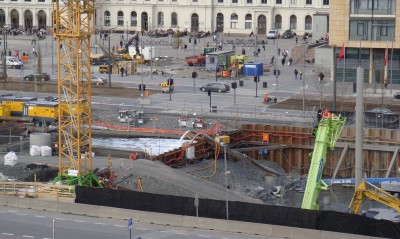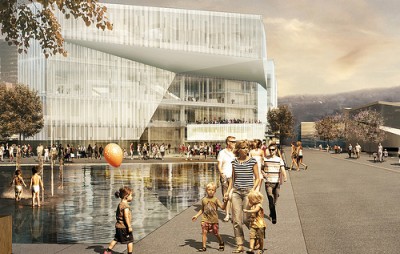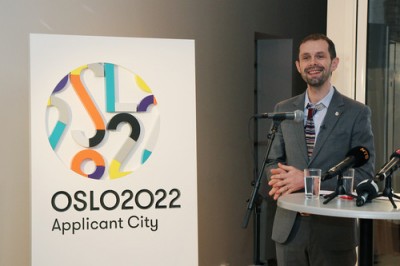One of the first major problems facing Oslo’s new Labour-led city government is the highly troubled construction of a new main public library. The entire project has come to a standstill and is already nearly NOK 400 million over budget, after the prior government insisted on building the library on a muddy site near the Opera House.

It was supposed to be another landmark project in the ongoing redevelopment of Oslo’s eastern harbour area known as Bjørvika, and meant to replace Oslo’s classic old but outdated Deichmanske Library near the state government complex downtown. The Bjørvika area already features the Opera House, the so-called “bar code” row of new high-rise office buildings and the waterfront Sørenga residential complex. Ground was recently broken for the new Munch Museum at Bjørvika as well.
The library project, however, remains a gaping hole in the ground, with water being continuously pumped out of its basin. It was supposed to be finished by the end of next year, or early 2017 at the latest, but now it’s delayed until at least 2019. Construction of the library has been plagued by the difficult, muddy ground where its sits on the waterfront at Bjørvika, which in turn has led to the ongoing water leakage.

ILLUSTRATION: Atelier Oslo og Lund Hagem Arkitekter
Last month, several weeks after work on the site ground to a halt, city officials in a reorganized department now charged with overseeing cultural and sports property (KID), broke its contract with the firm, Atlant, that was supposed to build the library’s foundation. “The responsible entrepreneur has not acknowledged that the contract obligations it has towards the City of Oslo will be fulfilled,” announced KID director Eli Grimsby, who earlier was behind the city’s failed bid to host a Winter Olympics in 2022. “Therefore we don’t have the certainty we need to go forward with the contracted work.”
Another firm that was involved, Nordisk Fundamentering, had broken its contract with Atlant in August. “It was worrisome that Atlant didn’t seem to have adequate resources and ability to manage and coordinate the work on a narrow and difficult construction site,” Ragnar Reitan of Nordisk Fundamentering wrote in another press release. That, according to Reitan, made it difficult to ensure standards related to health, the environment and safety, and led to “irrational production” and higher costs.
It all meant that the city must go out for bid again to find a new contractor to build the library’s foundation. In the meantime, newspaper Dagsavisen, which has followed the troubled library project closely, reported that financial documents tied to it have been made difficult to obtain. A consultant’s report delivered last week showed budget overruns already of NOK 382 million, with the entire project literally stuck in the mud. Proposals to cut costs on the project include reducing its inventory and even leaving some rooms unfinished and unfurnished, including a much-hyped cinema.

Library chief Kristin Danielsen didn’t want to comment on the consultant’s recommendations for either boosting budgets of lowering ambitions for the library when it finally gets built. She referred questions to the top city politician who’s ultimately been in charge of the ill-fated library project, Hallstein Bjercke of the centrist Liberal Party.
Bjercke, however, is now on his way out of city politics, given the formation of Oslo’s new city government, and he wouldn’t comment either. He has earlier consistently downplayed problems with the library project, saying as late as last spring that it would still become “a “fantastic new main public library in Oslo.” He told Dagsavisen only that the consultants’ latest report would be evaluated, and the cost overruns dealt with during supplementary budget negotiations later this fall.
Critics, including incoming city government leader Raymond Johansen, have claimed the entire library project was poorly managed and monitored, while others had concerns at an early stage over the muddy site that Bjercke allegedly ignored. Now the new city government inheriting the project must decide what to do. Former bosses who preceded Grimsby have already been fired or replaced as the project lurched through its foundation problems, reorganization of city departments, new reports, contract cancellations and, now, the construction standstill. “The city has admitted that its project management has been too weak,” Johansen said in April. Now he’ll be charged with strengthening it.
newsinenglish.no/Nina Berglund

